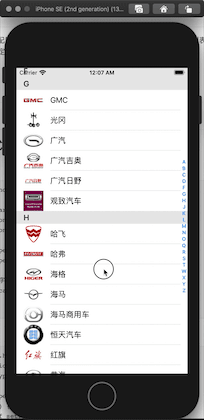一概述
本文介绍从plist配置文件中读取数据,并设置到UITableView中;在右侧设置列表索引,通过索引字母,快速定位到所在位置。
二 效果图

三 代码
3.1 OC模式下
Car.h
1
2
3
4
5
6
7
8
9
10
11
12
13
| #import <Foundation/Foundation.h>
@interface Car : NSObject
@property (nonatomic,copy) NSString *name;
@property (nonatomic,copy) NSString *icon;
-(instancetype)initWithDict:(NSDictionary *)dict;
+(instancetype)carWithDict:(NSDictionary *)dict;
//传入一个包含字典的数组,返回一个Car模型的数组
+(NSArray *)carsWithArray:(NSArray *)array;
@end
|
Car.m
1
2
3
4
5
6
7
8
9
10
11
12
13
14
15
16
17
18
19
20
21
22
23
24
25
26
27
| #import "Car.h"
@implementation Car
- (instancetype)initWithDict:(NSDictionary *)dict
{
self=[super init];
if (self) {
[self setValuesForKeysWithDictionary:dict];
}
return self;
}
+ (instancetype)carWithDict:(NSDictionary *)dict
{
return [[self alloc]initWithDict:dict];
}
+ (NSArray *)carsWithArray:(NSArray *)array
{
NSMutableArray *arrayM=[NSMutableArray array];
for (NSDictionary *dict in array) {
[arrayM addObject:[self carWithDict:dict]];
}
return arrayM;
}
- (NSString *)description
{
return [NSString stringWithFormat:@"<%@:%p>{name:%@,icon:%@}",self.class,self,self.name,self.icon];
}
@end
|
CarGroup.h
1
2
3
4
5
6
7
8
9
10
11
| #import <Foundation/Foundation.h>
@interface CarGroup : NSObject
//首字母
@property (nonatomic,copy) NSString *title;
//车的数组
@property (nonatomic,strong) NSArray *cars;
- (instancetype)initWithDict:(NSDictionary *)dict;
+(instancetype)carGroupWithDict:(NSDictionary *)dict;
+(NSArray *)carGroups;
@end
|
CarGroup.m
1
2
3
4
5
6
7
8
9
10
11
12
13
14
15
16
17
18
19
20
21
22
23
24
25
26
27
28
29
30
31
32
| #import "CarGroup.h"
#import "Car.h"
@implementation CarGroup
- (instancetype)initWithDict:(NSDictionary *)dict
{
self=[self init];
if (self) {
//[self setValuesForKeysWithDictionary:dict];
[self setValue:dict[@"title"] forKey:@"title"];
self.cars=[Car carsWithArray:dict[@"cars"]];
}
return self;
}
+ (instancetype)carGroupWithDict:(NSDictionary *)dict
{
return [[self alloc]initWithDict:dict];
}
+(NSArray *)carGroups
{
NSArray *array=[NSArray arrayWithContentsOfFile:[[NSBundle mainBundle]pathForResource:@"cars_total.plist" ofType:nil]];
NSMutableArray *arrayM=[NSMutableArray array];
for (NSDictionary *dict in array) {
[arrayM addObject:[self carGroupWithDict:dict]];
}
return arrayM;
}
- (NSString *)description
{
return [NSString stringWithFormat:@"<%@: %p> {title: %@, cars: %@}", self.class, self, self.title, self.cars];
}
@end
|
ViewController.m
1
2
3
4
5
6
7
8
9
10
11
12
13
14
15
16
17
18
19
20
21
22
23
24
25
26
27
28
29
30
31
32
33
34
35
36
37
38
39
40
41
42
43
44
45
46
47
48
49
50
51
52
53
54
55
56
57
58
59
60
61
62
63
64
65
66
67
68
69
70
71
72
73
74
75
76
| #import "ViewController.h"
#import "Car.h"
#import "CarGroup.h"
@interface ViewController ()<UITableViewDataSource>
@property (nonatomic,strong) NSArray *carGroups;
@property (nonatomic,strong) UITableView *tableView;
@end
@implementation ViewController
- (UITableView *)tableView
{
if (_tableView==nil) {
_tableView=[[UITableView alloc]initWithFrame:self.view.bounds style:UITableViewStylePlain];
_tableView.dataSource=self;
[self.view addSubview:_tableView];
}
return _tableView;
}
- (NSArray *)carGroups
{
if (_carGroups==nil) {
_carGroups=[CarGroup carGroups];
}
return _carGroups;
}
- (void)viewDidLoad {
[super viewDidLoad];
[self tableView];
// Do any additional setup after loading the view.
}
#pragma -数据源方法
//分组数
- (NSInteger)numberOfSectionsInTableView:(UITableView *)tableView
{
return self.carGroups.count;
}
//每一组的总数
- (NSInteger)tableView:(UITableView *)tableView numberOfRowsInSection:(NSInteger)section
{
CarGroup *group=self.carGroups[section];
return group.cars.count;
}
//每一单元内容
- (UITableViewCell *)tableView:(UITableView *)tableView cellForRowAtIndexPath:(NSIndexPath *)indexPath
{
//可重用标识符
static NSString *ID=@"Cell";
//让表格缓冲区查找可重用cell
UITableViewCell *cell=[tableView dequeueReusableCellWithIdentifier:ID];
//如果没有找到可重用cell
if (cell==nil) {
//实例化cell
cell=[[UITableViewCell alloc]initWithStyle:UITableViewCellStyleDefault reuseIdentifier:ID];
}
//设置cell内容
CarGroup *group=self.carGroups[indexPath.section];
Car *car=group.cars[indexPath.row];
//设置数据
cell.imageView.image=[UIImage imageNamed:car.icon];
cell.textLabel.text=car.name;
return cell;
}
//设置标题
- (NSString *)tableView:(UITableView *)tableView titleForHeaderInSection:(NSInteger)section
{
CarGroup *group=self.carGroups[section];
return group.title;
}
//右侧索引列表
-(NSArray<NSString *> *)sectionIndexTitlesForTableView:(UITableView *)tableView
{
return [self.carGroups valueForKeyPath:@"title"];
}
@end
|
